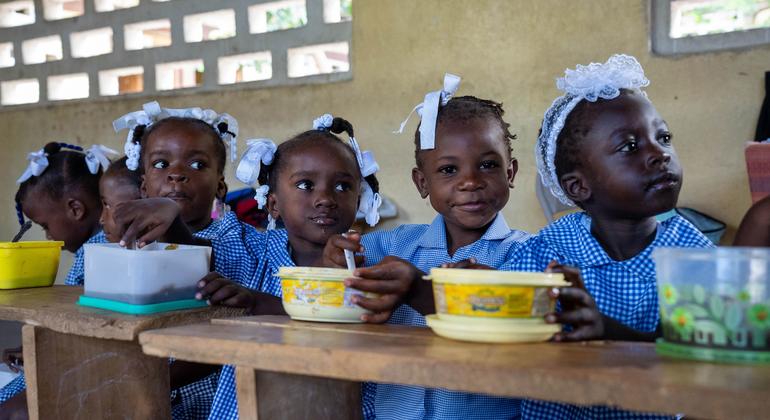On Saturday alone, the World Food Programme (WFP) provide more than 28,000 meals to people who have been forced to flee their homes.
Despite the widespread insecurity, WFP has delivered food assistance to some 480,000 people across the country since the beginning of March, thanks to partners on the ground – including Haitian non-governmental organizations, local businesses and Haitian farmers’ organizations.
Meals, medicine and more
The UN agency has distributed more than 358,000 hot meals to more than 69,000 people in 48 displacement sites in the capital over the past month.
Humanitarian partners also have delivered more than 2.3 million litres of water to nearly 29 displacement sites, which has benefited some 60,000 displaced people.
Traumatized Haitians, including children, have also received medicine and psychosocial support.
The health sector has been severely affected by the violence over the past month, with at least half of the health facilities in the capital either closed or functioning below their normal capacity.
The ongoing insecurity has worsened the already dire humanitarian situation in Haiti. More than 360,000 people are currently displaced, including some 160,000 in the Port-au-Prince metropolitan area, and more than 1,000 schools have been closed across the country.
Meanwhile, a $674 million humanitarian plan for Haiti, announced in February, is less than seven per cent funded.
Afghanistan: More than 10 children killed or injured in separate mine blasts
More than 10 children were killed or maimed in two separate landmine explosions in Afghanistan, the UN Children’s Fund (UNICEF) said in a tweet on Monday, expressing deep sadness.
The incidents occurred in Ghazni and Herat provinces. UNICEF extended deepest condolences to the families of the victims and wished a swift recovery to the injured.
Since 1989, nearly 44,000 Afghan civilians have been killed or injured by landmines and explosive remnants of war, averaging to around 110 people per month, according to the UN Mine Action Service (UNMAS).
A UNICEF report on the impact of explosive ordnance for 2022 documented around 700 children maimed or killed – a rate of approximately two children per day.
World Autism Awareness Day is marked by the UN annually on 2 April.
Guterres calls for unity to realize full rights of persons with autism
UN Secretary-General António Guterres called for ensuring an inclusive and accessible world for all in his message to mark World Autism Awareness Day on Tuesday.
The annual commemoration on 2 April is a moment to recognize and celebrate the important contributions of autistic people in every country and community.
“But around the world, they continue to confront barriers to their fundamental rights to education, employment and social inclusion — as called for by the Convention on the Rights of Persons with Disabilities and the 2030 Agenda for Sustainable Development,” he said.
Invest in support systems
The UN chief urged governments to invest in stronger community support systems, inclusive education and training programmes, and accessible and technology-based solutions to enable persons with autism to enjoy the same rights as others.
“Today and every day, let’s unite to realize their rights, and ensure an inclusive and accessible world for all,” he said.
Approximately one in 100 children has autism, which constitutes a diverse group of conditions related to development of the brain, according to the World Health Organization (WHO).
World Autism Awareness Day has been celebrated since 2007, following its proclamation by the UN General Assembly.
This year’s observance from UN Headquarters in New York will for the first time seek to provide a truly global overview from the perspective of autistic people representing six regions: Africa, Asia and the Pacific, Europe, Latin American and the Caribbean, North America and Oceania.


